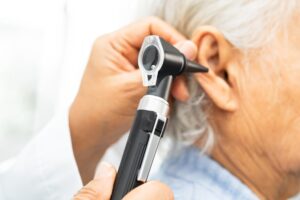Wearing hearing aids has long-held an unfortunate stigma. But why? Luckily, not only is the technology rapidly changing, but so are people’s attitudes toward wearing it — along with their health!
You might have memories of a family member, friend or schoolmate who wore hearing aids once upon a time. If your memory is at all similar to our own, then you’re probably picturing a large, clunky, sort of tan-colored colored device that was less than discrete in its appearance, one that would sometimes even make whistling sounds on occasion, drawing even more attention to the wearer than they might have felt comfortable with.
And, unfortunately, we might have associated the wearing of such technology either with “being old” (an inevitability of life that shouldn’t be considered inherently negative, but we digress) or with “being sick.” Of course, aging-related hearing loss is a real occurrence, and hearing loss can be associated with other comorbidities (the presence of two or more health conditions) but the important point is that hearing loss is largely preventable, treatable, and even aidable with the use of properly fit technology by audiological experts who focus on testing, educating their patients in ways that make them feel informed, empowered and confident in their options, and who focus on the right technology vs. the most expensive technology.
The good news is that attitudes are changing. But how? And why? Well, we believe that it’s for a few reasons:
It’s a matter of changing attitudes about privacy
It wasn’t too long ago that people were far less likely to share information about their health with anyone outside of a few close confidants. This could have been for any number of reasons, including simply wanting to keep personal information private, not wanting to or feeling self-conscious about receiving other people’s sympathy, or not wanting people’s perceptions about them to change in the instance that it could affect them on a personal or professional level.
But these acts born out of self-preservation had unfortunate consequences. For example, many people who are experiencing the effects of hearing loss find themselves in social situations, like at parties, restaurants, or sporting events, where they’re battling to hear and understand voices in the midst of many other sounds competing for their attention. The harder they strain to hear, the harder their brains and bodies must work in order to do so, regardless of how accurately they’re able to process this information. Point being, it’s exhausting. And the more exhausting it gets, the more likely it is that people experiencing these situations are going to avoid social situations. It becomes a vicious circle where hearing loss, exhaustion, and isolation all feed one another, worsening over time — and that’s the last thing we want for anyone in our community, because there are so many more options available than one might think.
It’s a matter of having access to more information
One piece of good news is that people are increasingly more open about their health and their healthcare endeavors. This is leading more and more people to feel more comfortable in making hearing healthcare decisions for themselves and with their loved ones that are helping them lead happier, healthier lives.
A huge benefit of social media and online reviews is that patients and loved ones have been empowered to be completely frank in regard to the quality specific practices, practitioners, and types of technology, giving those on the cusp of seeking care the sort of nudge to get treatment they need but might not otherwise get.
It’s a matter of normalizing total body health
All practices and manufacturers are going to say that they’re the best in their marketing and advertising, but there’s still nothing more powerful than real-life experiences as told by those who directly experience them. This is normalizing hearing healthcare and wearing of hearing technology. It’s also properly equating a focus on our hearing health much in the same way we consider our oral/dental health and our optical/vision health.
Look at this way: At least twice a year, we visit our dentist in order to get our teeth examined, cleaned, and our overall oral health assessed so that we can correct issues, prevent future problems from occurring, or simply continue doing what we’re doing to keep our mouths healthy.
Essentially, we do the same thing for our vision by seeing our optometrist on an annual basis for an eye exam, upgrading our eyeglass prescription if we have one, and making sure that we’re staying in front of any ocular issues that might occur. And we haven’t even touched on annual physicals! So why wouldn’t we do the same in regard to our hearing health?
It’s a matter of better, more integrated hearing technology options
At Colorado Ear Care, we believe that a great hearing care experience starts with relationship building and comprehensive testing before the conversation about hearing aid technology ever takes place. After all, one shouldn’t assume that 1) a hearing loss is present or that 2) hearing aids are the solution until we’re absolutely certain.
And the good news is that, should we determine that hearing aid technology is the right treatment method, there are numerous options to choose from, regardless of your type of hearing loss, your budgetary considerations, or the way in which you live your life.
Today’s technology, totally digital and incredibly sophisticated, is not only capable of integrating with Bluetooth-enabled smart phones, tablets, computers, and TVs, but certain devices can also be programmed to automatically change its settings to reflect the different environments you find yourself in and how it can best support your hearing to have more successful interactions with your friends, loved ones, or colleagues. Not only are the features plentiful and the benefits undeniable, but all this power comes in a more discrete design than you might think. Today’s hearing technology is small, subtle, and at your service. Just as we are!




